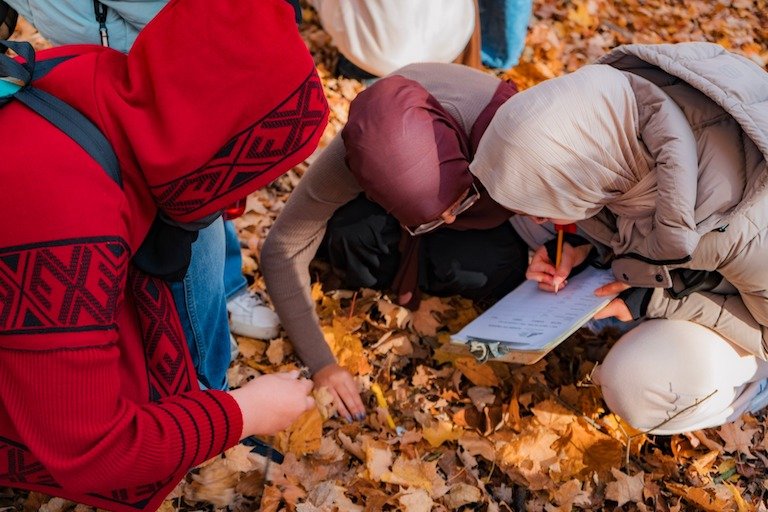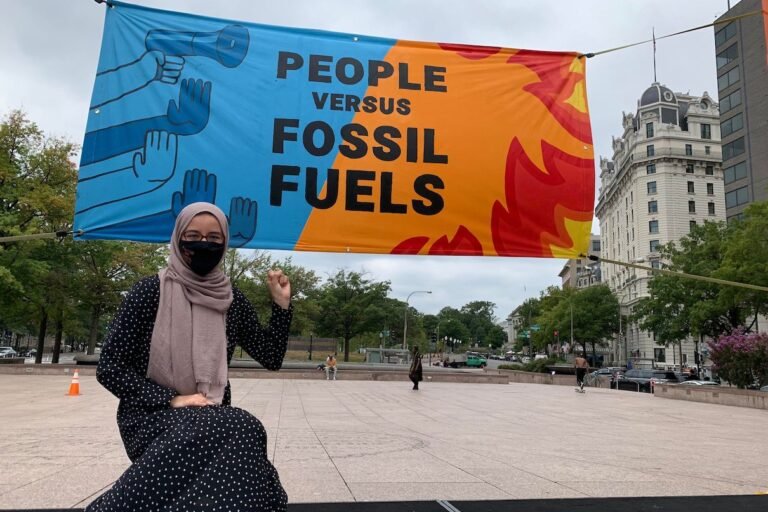Aim is help students make connections between sustainable habits and their cultural values.
A group of students note observations during a field trip to Dundas Valley Conservation Area in Hamilton. The trip was made possible by Green Ummah, a non-profit geared to creating an environmental movement within the Canadian Muslim community. (Studio Fadeelah)
A non-profit geared to creating an environmental movement within the Canadian Muslim community has taken its work inside the classroom. The aim is to help students make connections between sustainable habits and their cultural values.
Aadil Nathani, co-founder of Green Ummah — ummah means community in Arabic — said the group was created to help address under-representation in environmental causes among Muslim people as well as other racialized groups.
The organization worked with teachers and the environmental organization Nature Canada to develop a two-week curriculum program taught in both private Islamic school settings and public schools in communities with higher rates of racialized and newcomer Canadians. It's called the Greening Our Communities toolkit.
Nathani told Laura Lynch, host of CBC Radio's What on Earth, he believes the program is the only one in the world with ready-to-teach packages designed for teachers to engage their students on the topics of Islam and the environment, as well as environmental justice.
"We see these students as the future leaders in the world," said Nathani, who also acts as the group's director of operations and partnerships, and is a lawyer for a Toronto firm by day.
"If we can teach them about their role and responsibility in the environment early, the hope is that when they get into these positions of power later on, they will remember their teachings and act in a more careful and meticulous manner than a lot of folks have been doing for the past hundred-plus years."
Costs for the outing were covered by Nature Canada. School trips like this often carry a fee that can put them out of reach, especially at schools with high numbers of racialized and newcomer Canadians, said Aadil Nathani, Green Ummah's co-founder. (Studio Fadeelah)
Costs for the outing were covered by Nature Canada. School trips like this often carry a fee that can put them out of reach, especially at schools with high numbers of racialized and newcomer Canadians, said Aadil Nathani, Green Ummah's co-founder. (Studio Fadeelah)
He said Muslim communities in Canada have had limited capacity to get involved with environmental movements — and for good reason.
"I've grown up in a post-9/11 world where a lot of the concerns for the Muslim community have been, first and foremost, safety and security within Canada, within the United States," Nathani said, who resides in Scarborough, Ont, a Toronto suburb.
He points to tragedies in recent years when Islamophobia has erupted in deadly violence, such as the London, Ont., truck attack by Nathaniel Veltman, who killed four members of the Afzaal family in 2021, and the mosque shooting by Alexandre Bissonnette, who killed six people in 2017.
So far, the curriculum program has been run in Ontario high schools and workshopped at the middle-school level. But Nathani says the group's mandate is national, with online resources such as its Green Ramadan program available to anyone in Canada. The group is also hosting events in Alberta and B.C., including one happening this month with the non-profit NatureKids B.C.
Aadil Nathani is the co-founder and director of operations and partnerships for Green Ummah. (Submitted by Aadil Nathani)
Breaking down barriers to outdoor spaces
Nathani says the "coolest part" about the school-based program is the organization's partnership with Nature Canada, which bills itself as one of the oldest national nature conservation charities in Canada.
Funding from that group's NatureHood program has paid to send students on field trips to national wildlife areas, migratory bird sanctuaries or urban nature sites, such as Rouge National Urban Park in Toronto's east end, he said.
"This has been really unique for us because we also know that newcomer and racialized Canadians face barriers to accessing nature in Canada," said Nathani.
"So we've been able to break those barriers down entirely and actually just send students to do activities in nature spaces, which is great because it builds that connection to the environment and will hopefully lead to the students becoming environmental stewards in the future."
A student from Windsor Islamic High School offers a bowl of seeds to some geese on a field trip to Jack Miner Migratory Bird Sanctuary in Kingsville, Ont., about 45 kilometres outside of Windsor. (Submitted by Green Ummah)
Yavar Mirza, a Grade 11 student from Gibraltar Leadership Academy, an Islamic private school in Toronto, said the two-week program changed the way he views the environment.
"I began to see the natural world not just as, like, a resource for us, but something that is sacred," he said. "It made me realize that climate change is not just a scientific issue. It's a spiritual and moral responsibility that we all have together."
Mirza says, moving forward, he's committed to upholding the principles that he learned, such as "khilafah, which is basically a stewardship, and amana, which is like a trust that we have to protect the earth." For one thing, Mirza said he plans to be more conscious of his environmental impact by making sustainable choices.
"I would also want to focus on climate justice, especially advocating for solutions that support Indigenous communities and others that are affected by climate change."
Beyond doom and gloom
Nathani says the program was designed to address the problem of students hearing "so much doom and gloom," leading to environmental and climate anxiety.
"We wanted to let them feel like, yes, there are problems, but we can all collectively be part of the solution," he said.
Anees Chugtai, also in Grade 11 at Gibraltar, said that came through loud and clear.
"The program made me feel a lot more hopeful about humanity's rebuttal against climate change," he said.
"Before the program, I always thought, you know, that the world was just going downhill [and] that we weren't doing anything."
Lilian Tu, a teacher and science department head at Milliken Mills High School in Markham, Ont., said being able to access funds for field trips in nature has been a boon for students at the school. (Submitted by Lilian Tu)
Lilian Tu, a science teacher and department head at Milliken Mills High School in Markham, Ont., said the school has tapped into Green Ummah's curriculum and outdoor education resources for a couple of years.
She said the school is in one of York Region's lowest-income neighbourhoods, which sometimes means participation in field trips — which often carry a fee paid for by families — is out of reach. She said Green Ummah was able to fund "an amazing field trip at an outdoor centre," which was a first for many of her students.
Then last semester, Green Ummah funded a tree planting outing facilitated by Friends of the Rouge Watershed in Toronto's east end. Tu said many of the students weren't aware that this natural area was so nearby, and that it was empowering for them to learn that by planting a couple of trees, they could be capturing a lifetime of carbon for a family.
"So these kids made a significant contribution [through] this one-day field trip."
But the other great thing to see was the kids just having a good time together outside.
"They're creating spaces for trees to grow and making a huge difference, but they're also just playing as well."
Brandie Weikle is a writer and editor for CBC Radio based in Toronto. She joined CBC in 2016 after a long tenure as a magazine and newspaper editor. Brandie covers a range of subjects but has special interests in health, family and the workplace. You can reach her at brandie.weikle@cbc.ca.
This piece was originally published on CBC Radio - What on Earth on October 6th 2024.

















